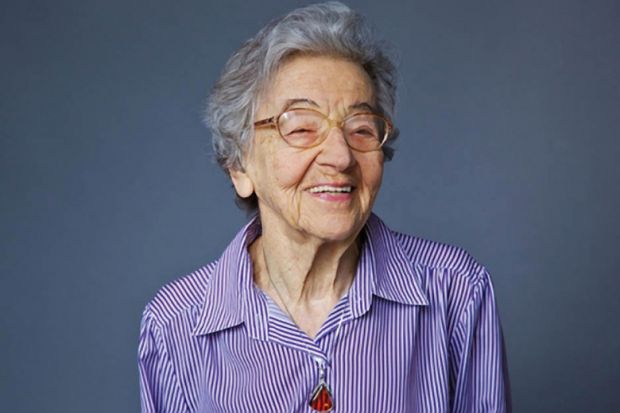Ursula Franklin, who was born Ursula Martius in Munich, Germany on 16 September 1921, once told an interviewer that as her mother was Jewish, she embraced science “largely because of other things that were foreclosed to me…
“I remember being at school and…seeing a cathode ray tube and the magnet and the beam being bent and I suddenly had this feeling of great joy that even they, those people in government who were after us, couldn’t make an electron beam bend in any other direction.”
Although she started a degree in physics and chemistry in Berlin, Professor Franklin was expelled for being Jewish, survived the war in a forced labour camp and, after completing a PhD in experimental physics at the Technical University of Berlin, moved to Canada in 1949 as a postdoctoral student at the University of Toronto.
While the University of Toronto was to prove her long-term academic home, she spent 15 years (1952-67) as a researcher at the Ontario Research Foundation, where her work on levels of strontium-90 in baby teeth helped to make the case for a moratorium on atmospheric nuclear weapons testing – an early indication of her lifelong opposition to militarism and her commitment to human rights.
In 1967, Professor Franklin rejoined the University of Toronto’s Faculty of Engineering. She became a full professor in 1973 and the first female university professor – the highest academic rank – in 1984.
She was also a senior fellow at Massey College, the postgraduate institution affiliated to Toronto, where her 1989 Massey Lectures formed the basis for her influential book, The Real World of Technology (1990).
A pioneer in the field of archaeometry, which uses materials science to date archaeological artefacts, Professor Franklin was equally well known for humanitarian work, particularly in pacifist and feminist causes, which won her the United Nations Association in Canada’s Pearson Peace Medal in 2002.
Her views on social justice and the political aspects of science were set out in publications such as The Ursula Franklin Reader: Pacifism as a Map (2006) and Ursula Franklin Speaks: Thoughts and Afterthoughts (with Sarah Jane Freeman, 2014).
A passionate campaigner for gender equality in science, Professor Franklin once said that she didn’t “want to adjust women to the rough, tumble rudeness that used to be the world of engineers. I want to change the world of engineers.” Equally useful was “hitting the guys on the rump every once in a while”.
Professor Franklin died on 22 July and is survived by her husband Fred, a son and a daughter.
Register to continue
Why register?
- Registration is free and only takes a moment
- Once registered, you can read 3 articles a month
- Sign up for our newsletter
Subscribe
Or subscribe for unlimited access to:
- Unlimited access to news, views, insights & reviews
- Digital editions
- Digital access to THE’s university and college rankings analysis
Already registered or a current subscriber? Login








